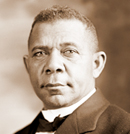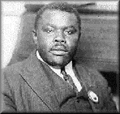If the beautiful immensity beyond 96th Street gets its own page, it is only because common sense so dictates. If you have the time, which most likely you will not because in Manhattan time is the only good currency in customs, you should definitely dedicate a whole day to it.
Almost no tourist visits it. And yet, there we can find the latin El Barrio, with the great market La Marqueta (between 112th and 116th Streets) and some of the most extraordinary things one can see in the entire world. But the most impressive one is Harlem.

Harlem began receiving black immigrants in the 19th century. But it only became an all-out "black neighborhood" when thousands of Jamaicans flocked in seeking a future in the New York industry.
However, the true "black renaissance" of the neighborhood that occurred in the 1920s -- when one couldn't live the New York night without going to the Cotton Club (which is still open today), the Lennox Avenue Club or the Connie's Inn, and when you couldn't take the U.S.' pulse without reading Langston Hughes, James Weldon Johnson or Alain Locke -- would never have existed without a legendary character: Marcus Aurelius Garvey, emperor of the Kingdom of Africa.
But before Marcus Garvey, there was Booker T. Washington.

He was an admirable man. A slave from Virginia, he started studying as soon as he was freed and, under Tuskgee University tutelage, began forming black teachers in order to elevate the African-American condition through education. In 1901 he published, to great success, his auto-biography Up From Slavery. Eventually he became an advisor to president Theodore Roosevelt.
His faith was in gradual, small changes, which took him further than any man had gone before. But there was a certain Uncle Tom quality to him: he was a black man with a white soul. Which, to African-Americans, is the worst thing an African-American can be.
Somebody more brassy, more sassy, less scrupulous, was needed. And that man was the Emperor of Africa.

In 1914, back in his native Jamaica, Marcus Garvey founded the Universal Negro Improvement Association following Mr Washington's doctrines. In 1916 he traveled to Manhattan to meet him, but found out the man had died.
He decided to make the best of his situation and settled in Harlem. He also started to preach a new gospel to his neighbors: the black had to be taught blackness. They had to feel proud of who they were. They didn't need to imitate the white.
"We’ve got to teach the American Negro blackness," he would say. "Black ideals, black industry, black United States and black religion."
He aimed to create those United Black States. They would include the African colonies, of course, which the main world powers would happily cede him in his authority as General-Provisional President of All the Negroes in the World.
He actually started to look the job, at least where clothing was concerned. He wore a flamboyant uniform with twisted cords, belts and decorations, he covered his head with a Napoleonic hat adorned with feathers. He would stroll across the neighborhood in an open carriage along with some of his ministers.
By 1919, Garvey owned a newspaper called Negro World, as well as several laundromats and restaurants. But these were minor businesses, below his imperial category.
So he founded the Black Star Line, a fleet of 24 great vessels (at least that was what he claimed -- in reality they were four and only two could stay afloat), a navy destined to change the luck of black people all over the world as well as alter its order forever. His followers bought millions of dollars worth of shares of his fleet. Marcus Garvey became a millionaire.
As it happened, however, the main world economies lacked the sensitivity and open-mindedness to deliver their African possessions to President Garvey. As it also happened, other, more radical Negro associations grew sick of this imperial bamboozling nonentity.
The Black Star Line fleet filed for bankruptcy. The United Black States went down the drain. Garvey was tried for fraud and sentenced to five years. After two years in jail, he got a pardon and moved to London.
So why was this character so important to the New York African Americans? Because he galvanized his community. He dared to dream big. He realized that his people couldn't rely on the whites -- and seeing how lynching proceeded for decades in the South of the U.S., he wasn't that far-off. He suggested the black should look for their own religion.
He is also important because he was as colorful as he was delightfully congenial, and because it is the closest thing to a 19th century emperor Harlem has ever seen.